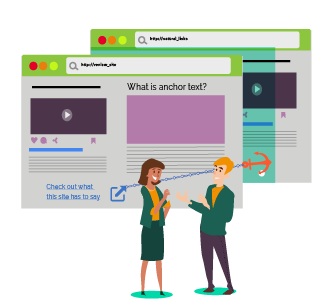Backlinking is an important part of SEO strategy. If you’re serious about making improvements to your website’s rankings, you need to prioritise your off-page optimisation.
This type of SEO is most often overlooked, but is extremely important, and can have huge implications for your website’s success.
Off-page SEO is all about building your brand’s reputation and trustworthiness away from your website. It encourages more searchers to visit your pages and to engage with your content and your brand.
Off-page SEO can be done in a variety of ways, including:
- Building an engaging presence on social media
- Guest blogging on other websites
- Encouraging users to leave testimonials on review sites

The most important player in off-page SEO is backlinking
Backlinking is the process of getting other websites to link to your content.
It is a major indicator to search engines on how credible your website is, and can really help you to rank highly.
We’re going to take a look at what backlinking is and why it’s so important for your website. We’ll also show you the things you need to be aware of when starting out on your link building strategy.
What is a Backlink?
When one website hyperlinks their text, image or button to a page on your website, they create a backlink to your site.
Simply put, a backlink is when a link is created between two different websites.
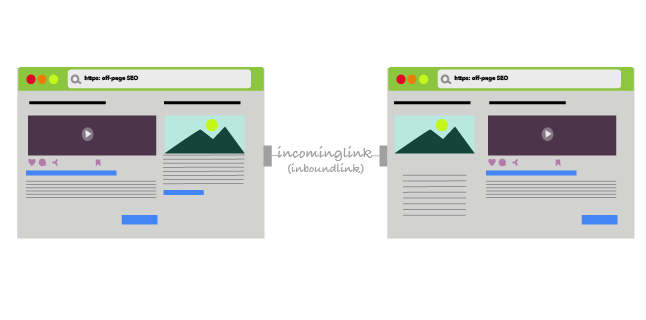
You may have come across backlinks before, as they’re commonly referred to as ‘inbound links’ or ‘incoming links.’
Why are Backlinks Important?
Backlinks are extremely valuable for your off-page SEO. When a site links to another, it’s effectively ‘vouching’ for that website.
It’s saying, ‘you should check out what this site has to say. They have some really useful information on the topic we’re talking about.’
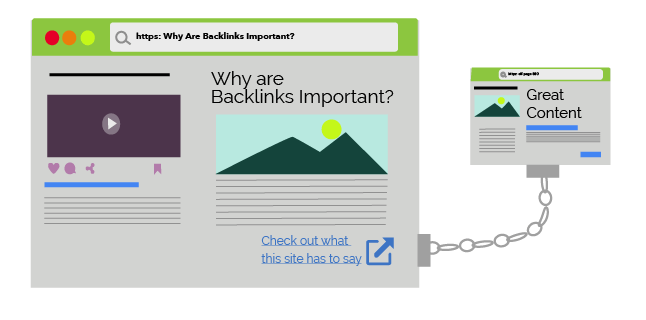
If a website has lots of inbound links, then search engines are able to infer that the content is valuable. This means it’s worth linking to, and therefore should be present on a search engine results page (SERP).
And so, earning these links can have a positive effect on a site’s visibility and its ability to rank.
How Do Backlinks Work?
Let’s take a look at how backlinking works.
Meet Flo.
Flo is a food blogger. She has recently written an interesting article which talks about the benefits of chia seeds on the body’s immune system.
Another blogger, John, who writes for a well-known online food magazine, is creating an article. His article is about the top 5 seeds you should be incorporating into your everyday diet. He links to Flo’s chia seed blog in his article.
Because John’s online food magazine is very popular, lots of other websites will link back to and share his article. This increases the magazine’s authority. As such, this means the backlink on Flo’s website is high quality, as it comes from a reputable website.

It’s a win-win. Flo is increases her website’s authority and rankings, by being connected to an authoritative website. And John, by writing genuinely helpful, informative, and shareable content, strengthens his magazine’s authority.
Types of Backlinks
There are two types of backlinks you need to be aware of, as some are more valuable than others.
Nofollow Links
When a search engine’s bot scans a webpage and sees a link with a nofollow tag, it tells them not to pass full SEO value to that destination url.
Nofollow backlinks won’t help in improving your search rank or visibility compared to a follow link.
But note, Google still looks at nofollow backlinks when assessing your site backlink profile. So, a nofollow link is far better than no link at all.
How to use a 'nofollow' tag:
To use a nofollow tag on your website, you will need to add a piece of code to the anchor text its linking to which looks a bit like this:
<rel=”nofollow”>
Nofollow links are used by a lot of directories and forums.
If any company, such as a directory, tells you that they will link to your site to help with your SEO, it is key to understand whether they mean a nofollow link or a dofollow link.
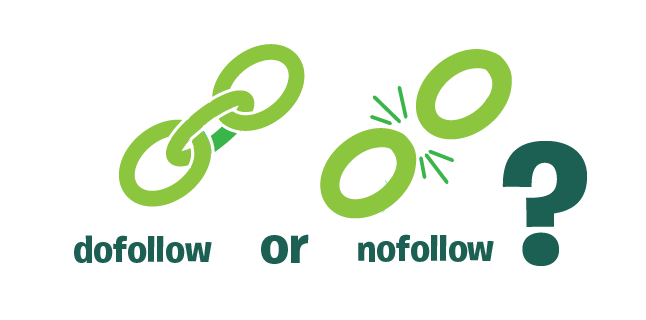
Often companies tell you to sign up and they will link to your site, but really they are not actually providing you with the valuable link you need.
Dofollow Links
Dofollow links let search engine bots follow them, so that they can reach your website and its content. Unlike nofollows, dofollow backlinks carry true value.
When an authoritative site links to your content, search engine bots will crawl this site. It then infers that this website thinks that your content is valuable. It will then start to reassess your ranking.
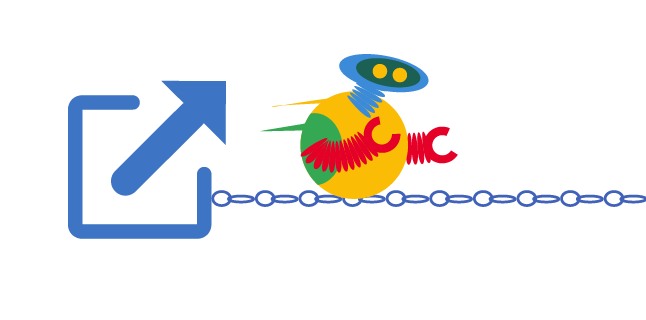
The more links you get, the more you get recognised as a high authority site. As your content gets seen as more valuable, your ranking for keywords around that subject will improve.
How to use a 'dofollow' tag:
Unlike nofollow, to allow bots to scan a dofollow link, you do not need to add anything to your code.
Just remember to check it doesn’t have the ‘nofollow’ code in your Javascript.
Always remember to check backlinks to your site, so you know what you are gaining and losing over time.
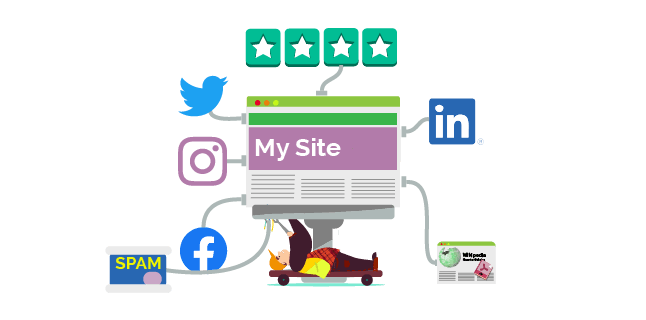
Do your research
If you work with any SEO agency, make sure that the links they obtain for you are of good quality. Not just crappy links which aren’t going to help you grow over the long term. Ask them what their strategies are to obtain links.
Please note: The most effective backlinking comes from effective content marketing. Nail your content marketing and your backlinks will start to look after themselves.
Avoiding Spam-Linking Activities
If you were an active internet user around a decade ago, you may have stumbled on a few websites or blogs that contained large chunks of gibberish text and lots of hyperlinks.
Shady SEO marketers used these sites, or ‘link farms’ as they’re commonly referred to, to cheat. Link farms were used to artificially inflate SEO ranks so that they appeared on top of Google SERPs.
Luckily, Google eventually caught wind and intervened. They updated their algorithm and punished these spam sites from being able to rank at all.
Times have changed
Today, only websites that produce high quality and valuable content can depend on their content to rank highly. And, the backlinks they have on their site need to come from credible websites with content of equal or higher quality.
Otherwise, Google will interpret them as spam.
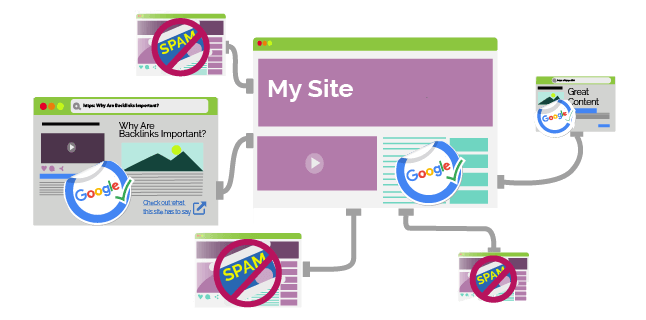
Therefore, when link-building for your website, you want to make sure you’re working with websites that have a strong domain authority. As well as, those sites that publish content related to your business.
If not, you’ll only be making it harder for your website to rank, and stopping prospective searchers find you entirely.
Anyone who tells you they can get you loads of links without creating great content is either doing something dodgy, super smart (way smarter than us anyway), going to get caught or all three of these things.
Creating Shareable Content
Off-page and on-page SEO work hand-in-hand. And your overall SEO strategy should prioritise both. After all, you want to encourage people to link back to your website.
To do this, you first need to have quality content for them to want to link back to. And, for your content to rank at all, it needs to be optimised for SEO.
Keep it relevant
Every piece of content you publish needs to be relevant, informative and offer a fresh perspective on a topic.
Never repeat what someone else is saying. Not just from a shareability point-of-view, but from a copyright point of view. If Google or any other search engine suspects you of copying content, you’ll be punished accordingly.
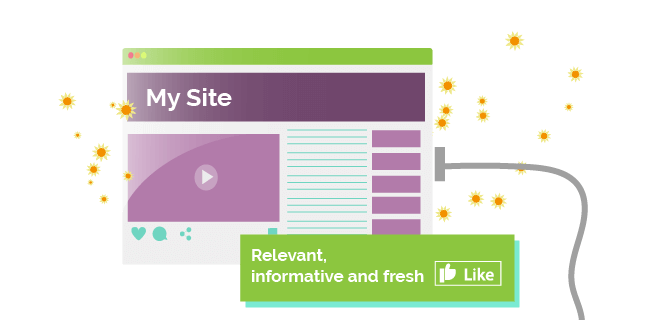
Gaining Backlinks for your Website
The process of gaining these backlinks is called ‘link-building.’ It’s an essential process in any off-site SEO strategy and takes time to get right.
You’ll need to reach out to other websites and forge connections. Then, you’ll need to persuade them that the content on your website is worth linking to.
Backlinking shouldn’t just be about going to other domains and asking them to link for the sake of linking.
To link build is to be creating value for the linker
Instead, you want it to be relevant and purposeful for your target customers and you need to offer something that they will want.
For example, someone asking me to link to their latest article on the basics of content marketing provides little value for my audience.
Think about what provides real value
However, speaking to a legal news site about an article I created on ‘how legal companies can get ahead with their content marketing’ is valuable.
Then, offering to write a guest post for them on the subject could work really well.
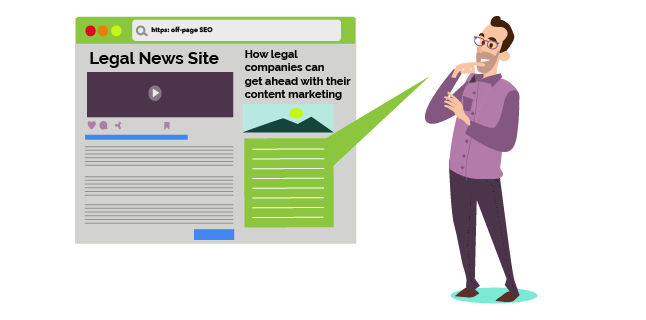
You need to build a backlinking plan that creates value for your targets’ audience. That is the key to great backlinking. Start with this premise and then work backwards to discover what content you should be creating.
Remember to Keep Track of your Accreditation
Sometimes, a website may mention your brand or share content from your website, but forget to include a link back to your website.
It’s vital you keep tabs on which websites you’ve reached out to and shared your content with. This process is called link reclamation.
Keep a spreadsheet with links to all the sites you’ve connected with, so you can track the sites who promised you a backlink. Then make sure they’ve accredited you with the backlink you were promised.
However, if you’re short on time, there are also plenty of tools out there which can also track your backlinks for you. We use SEMrush, for example.
Summary
Backlinking is just one of the ways you can optimise your off-page SEO, and should form a part of your overall SEO strategy.
It’s all about getting other reputable sites to link to your content. To give the nod to search engines that your website has lots of helpful information. And that your content deserves to be looked at.
If you can get backlinks from websites of high authority, then you’ll be improving your site’s reputation, and your overall rankings.
It's about time and value
You need to take the time to research and review your backlinks regularly. This ensures search engines only follow the hyperlinks that are truly valuable to your site.
Most importantly, you need to create content that other people are genuinely interested in backlinking to. Your content marketing and backlinking strategies should align for maximum growth.
Hiring a Marketing Consultant to Manage Your Backlinks
To do your backlinking and content marketing well, you need to dedicate significant time and commitment.
You need to regularly review your marketing strategy; find new websites to connect with; produce engaging content; and review the health of the sites that are linking to you.
If your business is relatively small, or you’re a new start-up, then you may not have the resources available to dedicate to backlinking, or an overall SEO strategy.
Can we help?
This is where working with a marketing consultant like myself could be beneficial for your business. Together, we can create an actionable plan that improves your on and off-page SEO to reach your business goals.
My team and I can even implement your plan for you, and conduct regular reviews to see the progress of your website’s SEO.
If you’d like to find out more about how our services may be of use to you, get in contact today. We’d be happy to have an obligation-free chat with you, learn more about your business and what your goals for online are.




